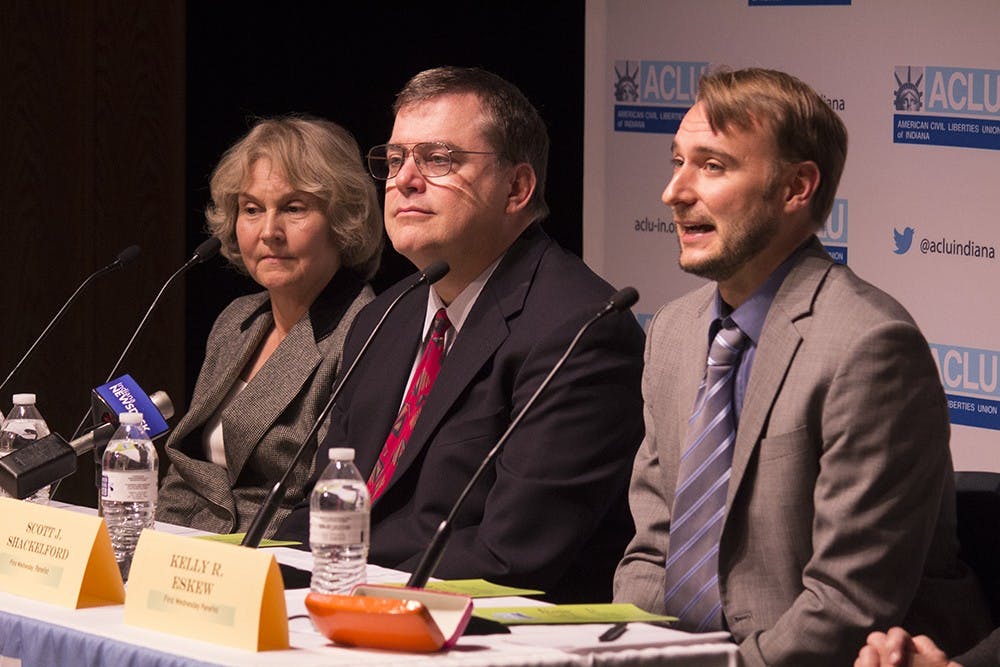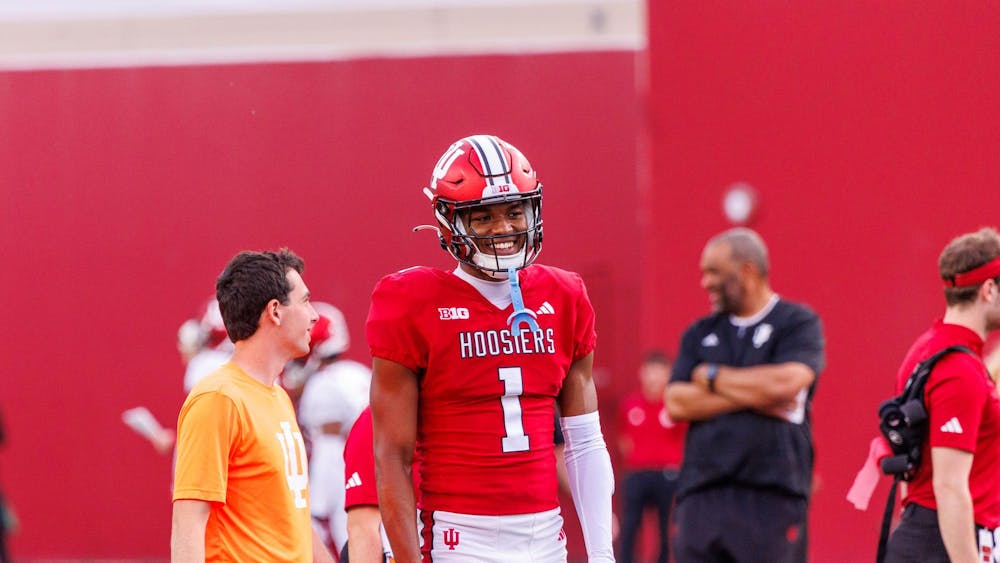The “Not-So-Private Lives of Hoosiers” panel consisted of four IU professors: Fred Cate and Scott Shackelford, who specialize in cybersecurity law; Christine Von Der Haar, from sociology and media; and Kelly Eskew, a former ACLU staff attorney who is currently teaching in the Kelley and McKinney Schools.
Shackelford said while technological advances are useful and convenient, in the Internet age, there are more ways for the government and private sector to take and use information about location, communication and buying habits than ever before.
“We’re really far away from the definition of privacy as ‘the right to be left alone,’” Shackelford said.
In the post-Sept. 11 world, national and global security concerns have decreased private and civil rights in the name of keeping the majority safe, Shackelford said.
However, governmental data collection is not the most accurate way to track whether a person is a crime risk, Cate said.
“Terrorists and students look identical in the data world,” Cate said. “They live with people they’re not related to, they move around, they don’t have an obvious source of income.”
Cate said the federal government has “an insatiable appetite” for data collection, which can be and has been useful in dissuading terrorism, money-laundering and other major crimes.
However, the more data becomes available, the more the government will collect and parse through, he said.
Cate said where there is potential for use, there is potential for misuse.
Von Der Haar said she would never have predicted the government would read her emails until it happened.
According to the ACLU’s complaint, Von Der Haar was arrested and detained by United States Customs and Border Protection agents at the Indianapolis International Airport in June of 2012.
Von Der Haar had recently reconnected with Dimitris Papatheodoropoulos, a friend from Greece who had, since she’d met him, become a transportation manager for two Olympic Games and the Arab Games in Qatar.
Papatheodoropoulos came to visit Von Der Haar in the U.S. and had shipped some of the computer equipment he would need for a new job as well, she said.
When the two went to pick up his property, they were detained, separated and questioned. During the course of the questioning, Von Der Haar was told the security officers had read the last year of email correspondence between her and Papatheodoropoulos.
“I was just bewildered by what had occurred here,” Von Der Haar said. “We never did find out why I was targeted — and I was.”
Two weeks later, she contacted the ACLU and filed a lawsuit, which she later won.
Eskew, who worked with the ACLU during Von Der Haar’s case, said the withholding of some information during court proceedings was more troubling than the surveillance.
The two officers who made statements made separate claims about how they’d acquired copies of Von Der Haar’s entire correspondence with Papatheodoropoulos.
One claimed Papatheodoropoulos had handed them the printed copies of all the emails when he arrived at the airport, Eskew said.
The other claimed they’d found the printed copies of the emails in one of the boxes Papatheodoropoulos shipped to the U.S.
When the ACLU requested a transcript of Papatheodoropoulos’ questioning, which, according to the ACLU complaint, lasted about five hours, the version they were given was only about six pages long, Eskew said.
Border control is another area where Americans have ceded many of their rights, as copying and seizing electronics is allowed virtually without proof of cause for suspicion, Cate said.
Cate said in an ideal situation, people should only be detained when there is some proof of cause for alarm.
More oversight of surveillance — having to document who is being surveilled and for what reason - could also cut down on unnecessary breaches of privacy.
Cate said when a person is surveilled, they should always receive notice their privacy was invaded.
It’s ridiculous that a person who is accused of the crime they were investigated for has greater ability to respond to privacy violation than an innocent man or woman, Cate said.
In the wake of her exposure, Von Der Haar said she’s cut down on almost all email communication, has no internet at her house and assumes her mail is inspected.
She said she believes the government is still monitoring her.
Given the amount of data generated by the average Internet user, the panel was unable to come up with an immediate way to protect against privacy violations.
Avoiding handing out details like phone numbers or emails when prompted can help, Cate said. Shackelford suggested using the Tor Project or DuckDuckGo, a nontracking search engine, especially on public wifi.
Cate also advocated voting for politicians who support privacy rights.
If Americans are lax about keeping the government accountable for its mistakes, they will never learn to take the issue seriously, he said.
“At the end of the day, there’s no one to be held accountable but us,” Cate said.






